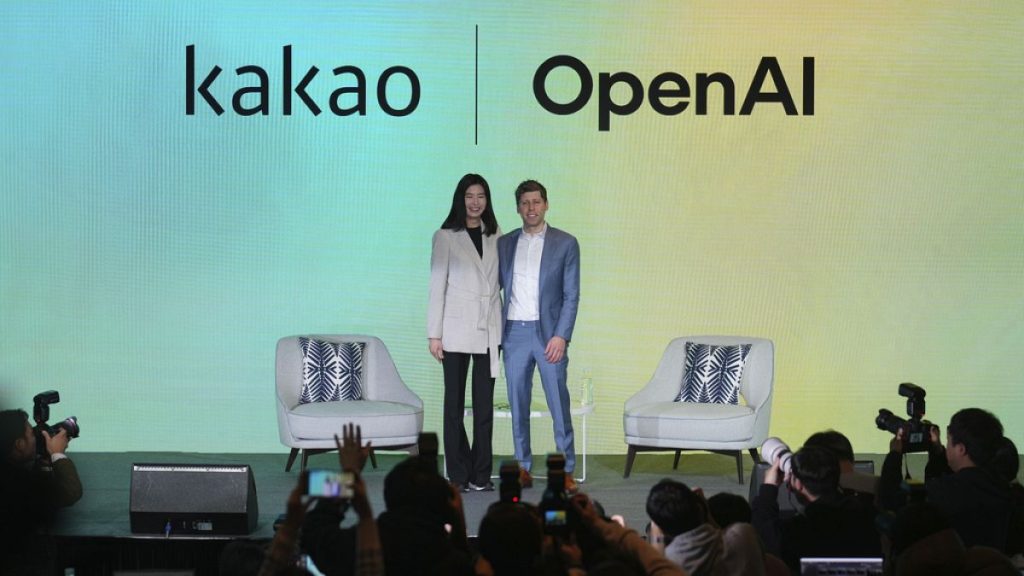OpenAI, the US-based artificial intelligence company behind the revolutionary chatbot ChatGPT, is aggressively expanding its footprint in Asia, solidifying its position as a global leader in the rapidly evolving AI landscape. This strategic move is marked by a series of high-profile partnerships with prominent Asian tech giants, beginning with South Korea’s Kakao and followed by Japan’s SoftBank. These collaborations signal OpenAI’s commitment to tailoring its AI offerings to specific regional needs and integrating them into established platforms, accelerating the adoption of generative AI technologies across diverse industries and user bases. The establishment of these partnerships also underscores the growing recognition of AI’s transformative potential and the intensifying competition among tech companies to secure a leading role in this burgeoning field.
The partnership with Kakao, operator of South Korea’s dominant messaging app KakaoTalk, will focus on developing localized AI products leveraging OpenAI’s cutting-edge technology. Kakao’s expansive ecosystem, encompassing e-commerce, payments, and gaming, provides a fertile ground for integrating AI-powered solutions and reaching a vast user base. This collaboration follows closely on the heels of OpenAI’s joint venture with SoftBank, resulting in the formation of SB OpenAI Japan, a dedicated entity focused on deploying and customizing OpenAI’s technologies for the Japanese market. SoftBank’s ambitious plan to invest €3 billion annually in integrating its AI service, Cristal, across its portfolio companies, including Arm and PayPay, demonstrates the substantial commitment being made to harness the power of AI for enhanced productivity and innovation.
OpenAI’s strategic expansion into Asia comes amidst a dynamic and rapidly evolving AI landscape. The emergence of competitors like China’s DeepSeek, with its claims of developing cost-effective, high-performance AI, intensifies the pressure on established players like OpenAI to maintain their competitive edge. This evolving landscape necessitates strategic alliances and rapid innovation to navigate the challenges and capitalize on the immense opportunities presented by the global AI market. OpenAI’s proactive engagement with key Asian players underscores its commitment to adapting to regional specificities and fostering collaborative efforts to drive AI adoption and advancement.
OpenAI CEO Sam Altman’s whirlwind tour of Asia, including meetings with top executives at South Korean tech giants like SK Hynix and Samsung Electronics, highlights the importance of building strong relationships and fostering collaboration within the global tech ecosystem. These engagements underscore the interconnectedness of the AI industry, with hardware manufacturers like SK Hynix, known for its high-bandwidth memory chips crucial for AI processing, playing a vital role in supporting the development and deployment of AI technologies. The collaborations and discussions taking place during Altman’s tour emphasize the collective effort required to advance the field of AI and integrate it seamlessly into various sectors, driving innovation and economic growth.
The Stargate initiative, a collaborative project involving OpenAI, SoftBank, and Oracle, with reported backing from former President Donald Trump and substantial investment in US AI infrastructure, aims to accelerate the development and deployment of AI technologies on a large scale. This initiative underscores the growing recognition of AI’s strategic importance and the need for significant investment to unlock its full potential. SoftBank’s stated intention to expand Stargate into Japan and other countries signifies the global ambition of this project and its potential to shape the future of AI development and application across diverse industries and geographies.
OpenAI’s recent advancements in “deep research,” enabling ChatGPT to perform complex tasks like preparing reports by rapidly processing vast amounts of information, demonstrate the rapid progress being made in enhancing the capabilities of AI systems. This enhanced functionality has significant implications for various industries, enabling increased productivity, automation of complex tasks, and more efficient decision-making. The continued development and refinement of such capabilities will further solidify AI’s transformative potential and drive its widespread adoption across numerous sectors, revolutionizing workflows and unlocking new possibilities for innovation and growth.














